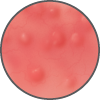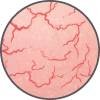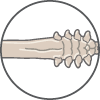About Rosacea
WHY DO PEOPLE GET ROSACEA?
 |
Why people get rosacea is unknown, and while there is no cure, medical therapy is available to control or reverse its signs and symptoms.2 |
 |
Doctors do not know the exact cause of rosacea but believe that a tendency to develop the disorder may be genetic.6,7 |
 |
People who blush frequently might be more likely to develop rosacea. Some researchers believe that rosacea is a disorder where blood vessels dilate too easily, resulting in flushing and redness.6 |
 |
The immune system may play a role. Researchers found that most people with acne-like rosacea react to a bacterium called bacillus oleronius. The reaction causes their immune system to overreact. However, further study is still needed.7 |
 |
The demodex mite that lives on everyone’s skin, particularly on the nose and cheeks, might play a role. Studies have found that people with rosacea have large numbers of the mite on their skin, but it is important to note that individuals who do not suffer from rosacea can also exhibit large populations of the mite.7 |
 |
Factors that cause rosacea to flare up in one person may not affect another person. People have identified the following items as triggers that aggravate their rosacea: heat (including hot baths), intense exercise, sun or wind exposure, extremely cold or hot temperatures, hot or spicy food and drink.1,6 |
 |
Alcohol consumption, menopause, stress, certain medications (vasodilators and topical steroids), and bacteria are additional factors that may cause rosacea to flare up.1,6 |
WHO GETS ROSACEA?
 |
Women especially over age 305 |
 |
Individuals with fair skin, particularly if it has been damaged by the sun5 and people of Celtic or Northern European descent with fair skin4 |
 |
Individuals with a family history of rosacea5 |
 |
Individuals who smoke5 |
